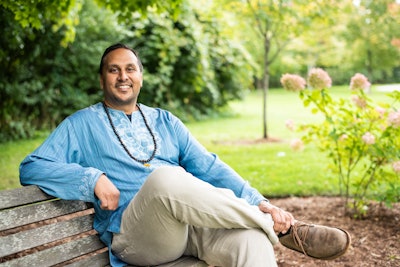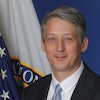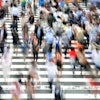When he was first asked to educate people on Islamophobia, DEI expert Dr. Amer F. Ahmed – a scholar of South Asian descent with multiple Black studies degrees to his name – was worried he would get “pigeon-holed.” But after he began teaching about the issue, he gradually changed his mind. Dr. Amer F. Ahmed
Dr. Amer F. Ahmed
“Once I did start giving those presentations, I was shocked and concerned at the degree to the lack of context and information that a lot of my colleagues had about my community,” said Ahmed said. “So I started to make more of an effort to educate my colleagues, my field, [and] the general public on the ways in which Islamophobia was functioning and operating in our society and even my own personal experience related to that."
Ahmed – who is vice provost for diversity, equity, and inclusion at the University of Vermont – has been working in the field of diversity for over 20 years, educating, consulting, and training people about DEI matters, mostly focused on higher ed.
With family originally from India, Ahmed was raised Muslim, an upbringing and background that he said gave him a unique lens into his later field.
“At every stage of my career, I was essentially the first identifiably Muslim person to get to the kind of position that I was getting to,” Ahmed said. “So I didn't have a lot of examples in front of me – if any – of people of my background getting to where I got to in the field."
The senior diversity officer holds an Ed.D. in adult and higher education from the University of South Dakota Vermillion; an M.A. in Afro-American and African diaspora studies and anthropology from Indiana University Bloomington; and a B.A. in anthropology and Black world studies from Miami University in Ohio.
Ahmed said that he came into the diversity field after working with students and he wanted to be part of the ongoing effort to address insufficient equity and inclusion at many Predominantly White iIstitutions (PWIs). He also co-owns a module-based DEI training product for faculty, staff, and students.
His work has spanned several postsecondary institutions. Some of his previous appointments include serving as chief diversity officer at Dickinson College; director for intercultural teaching and faculty development at University of Massachusetts Amherst; intercultural center director at Swarthmore College; and associate director of multi-ethnic student affairs at University of Michigan Ann Arbor.
“Dr. Ahmed is one of the nation’s true experts on Islamophobia and, importantly, how institutions need to engage this challenge as part of their Inclusive Excellence strategy,” said Dr. Damon A. Williams, founder of the National Inclusive Excellence Leadership Academy (NIXLA) and former vice provost and chief diversity officer at the University of Wisconsin-Madison. “I have known him for years as a colleague and also as an alumni of NIXLA. He has done fantastic work at every institution he has worked and also on the national stage.”
One of the most prominent DEI issues as of late has been the rising incidents of antisemitism and Islamophobia on college campuses since the Oct. 7 Israel-Hamas conflict. Ahmed views Islamophobia as both an issue of race and religion, given that even people who do not identify with Islam are affected by the hate.
"There's a deep fear in our community, a fear of saying anything, a fear of moving in a way in which one would be identifiably Muslim, including many Muslim women who wear hijabs as part of their observance,” Ahmed said. “There are concerns about the kind-of return to the profiling and discrimination and hate crimes that we have seen, and quite honestly we are seeing those things in our country right now."
Just two weeks ago, three Palestinian college students were shot and severely wounded by a man while they were out walking in Burlington, just a few blocks from Ahmed’s office. One of the victims, Hisham Awartani was shot in the spine and is currently at risk of permanent paralysis in his legs.
Ahmed said that he hasn’t seen Islamophobia of this intensity in the U.S. since the post 9/11 era.
Rhetoric by elected officials, he said, has not helped to ease tensions.
"I'm well aware of the consequences of high-level public officials framing groups of individuals as evil and the dehumanization that that creates and then therefore the space and permission that that gives Islamophobes to engage in hateful acts directed towards us,” Ahmed said.
The current lack of awareness about the rise of Islamophobia on U.S campuses is problematic, he added.
"I think that there's definitely antisemitism on campuses. But I think that we're not hearing a lot on a number of our campuses about the rising Islamophobia at the same time,” he said. “My sense is there's not been the level of concern or focus that there needs to be to try to mitigate dangerous rhetoric or perceptions that result in violent acts, like we've seen here in Burlington.
“And so, I really want my colleagues in higher education to really commit to learning and understanding more about how to address Islamophobia on our campuses and why it's such a critical moment to do so."





















